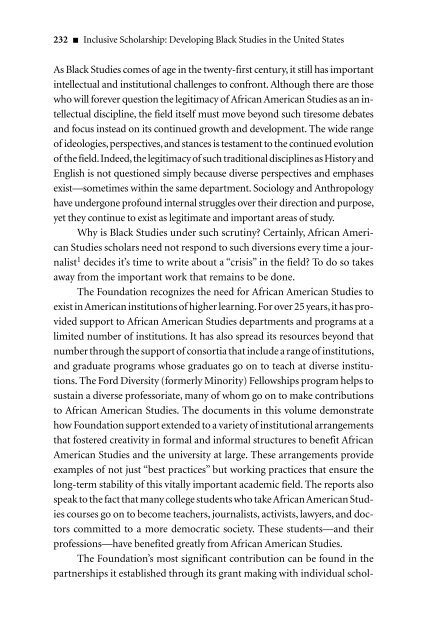Inclusive Scholarship: Developing Black Studies - Ford Foundation
Inclusive Scholarship: Developing Black Studies - Ford Foundation
Inclusive Scholarship: Developing Black Studies - Ford Foundation
You also want an ePaper? Increase the reach of your titles
YUMPU automatically turns print PDFs into web optimized ePapers that Google loves.
232 <strong>Inclusive</strong> <strong>Scholarship</strong>: <strong>Developing</strong> <strong>Black</strong> <strong>Studies</strong> in the United States<br />
As <strong>Black</strong> <strong>Studies</strong> comes of age in the twenty-first century, it still has important<br />
intellectual and institutional challenges to confront. Although there are those<br />
who will forever question the legitimacy of African American <strong>Studies</strong> as an intellectual<br />
discipline, the field itself must move beyond such tiresome debates<br />
and focus instead on its continued growth and development. The wide range<br />
of ideologies,perspectives,and stances is testament to the continued evolution<br />
of the field.Indeed,the legitimacy of such traditional disciplines as History and<br />
English is not questioned simply because diverse perspectives and emphases<br />
exist—sometimes within the same department. Sociology and Anthropology<br />
have undergone profound internal struggles over their direction and purpose,<br />
yet they continue to exist as legitimate and important areas of study.<br />
Why is <strong>Black</strong> <strong>Studies</strong> under such scrutiny? Certainly, African American<br />
<strong>Studies</strong> scholars need not respond to such diversions every time a journalist<br />
1 decides it’s time to write about a “crisis” in the field? To do so takes<br />
away from the important work that remains to be done.<br />
The <strong>Foundation</strong> recognizes the need for African American <strong>Studies</strong> to<br />
exist inAmerican institutions of higher learning.For over 25 years,it has provided<br />
support to African American <strong>Studies</strong> departments and programs at a<br />
limited number of institutions. It has also spread its resources beyond that<br />
number through the support of consortia that include a range of institutions,<br />
and graduate programs whose graduates go on to teach at diverse institutions.<br />
The <strong>Ford</strong> Diversity (formerly Minority) Fellowships program helps to<br />
sustain a diverse professoriate, many of whom go on to make contributions<br />
to African American <strong>Studies</strong>. The documents in this volume demonstrate<br />
how <strong>Foundation</strong> support extended to a variety of institutional arrangements<br />
that fostered creativity in formal and informal structures to benefit African<br />
American <strong>Studies</strong> and the university at large. These arrangements provide<br />
examples of not just “best practices” but working practices that ensure the<br />
long-term stability of this vitally important academic field. The reports also<br />
speak to the fact that many college students who takeAfricanAmerican <strong>Studies</strong><br />
courses go on to become teachers, journalists, activists, lawyers, and doctors<br />
committed to a more democratic society. These students—and their<br />
professions—have benefited greatly from African American <strong>Studies</strong>.<br />
The <strong>Foundation</strong>’s most significant contribution can be found in the<br />
partnerships it established through its grant making with individual schol-

















